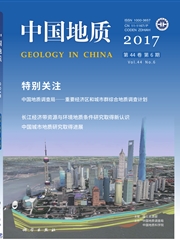

 中文摘要:
中文摘要:
位于塔里木地块西南缘、西昆仑造山带北缘的帕什托克侵入序列由石英闪长岩-石英二长闪长岩组成,类似TTG组合,形成于中元古代晚期.本文从帕什托克侵入序列的地球化学分析出发,通过对该侵入序列两期侵入岩的主量元素和微量元素的研究,讨论了该侵入序列的成因、构造环境和与其相关的板块间地球动力学模式,认为该侵入序列为Ⅰ型准铝质高钾钙碱性花岗闪长岩系列,属活动板块边缘碰撞前大陆弧花岗岩类,两期侵入岩为同源岩浆演化,母岩浆属壳幔混合源,且岩浆向酸性演化.根据岩浆演化的物理环境和构造环境,推测早古生代库地洋的完全闭合与库地洋壳向塔里木古陆块俯冲消减有关,是塔里木古陆块和柴达木古陆块在Rodinia超级大陆汇聚过程中的产物.
 英文摘要:
英文摘要:
Pashtok intrusive sequence, located in the southwestern margin of the Tarim Block and the northern margin of the West Kunlun orogenic belt, is composed of quartz diorite and quartz monzonitic diorite, which is similar to TTG combination. It was formed in the late Mesoproterozoic. Large quantities of data prove that the strata and rocks located in the northern edge of West Kunlun orogenic belt still retain the records of orogenic events, plate subduction and convergence at the end of Mesoproterozoic, and they confirm that late Mesoproterozoic southwestern Tarim paleoplate belongs to the present active continental margin. Tarim ancient block was a part of Rodinia supercontinent. The early Paleozoic closure of the Kuda Ocean was closely related to the subduction between Kuda crust and Tarim ancient block. At the beginning of geochemical analysis, main elements and trace elements of Pashtok intrusive sequence were studied in detail. A discussion was made concerning the genesis of the intrusive sequence, the tectonic setting and the geodynamic model between plates around the intrusive sequence. The research shows that Pashtok intrusive sequence is of the I-type metaluminous high-K calc-alkaline granodiorite series, which belongs to continental arc granitoids of active continental margin. The intrusive sequence is divided into two intrusive periods. Both periods of intrusive rocks experienced comagmatic evolution, and the parental magma was a mixture of crustal materials and mantle magma, which gradually evolved into more acidic magma. Based on physical environment and tectonic setting in the course of magmatic evolution, the authors have reached the conclusion that the subduction of the Kuda Ocean crust brought about the closure of the Kuda Ocean and the convergence between Tarim ancient block and Qaidam ancient block which were pieced together and gradually became a part of the Rodinia supercontinent.
 同期刊论文项目
同期刊论文项目
 同项目期刊论文
同项目期刊论文
 期刊信息
期刊信息
